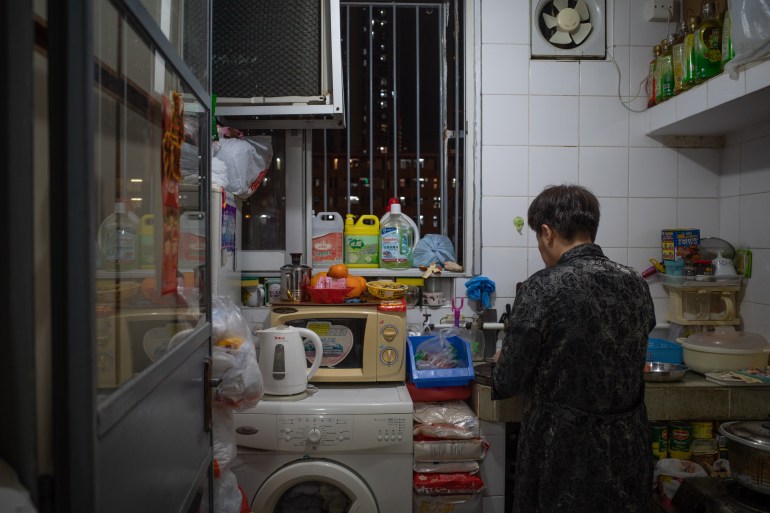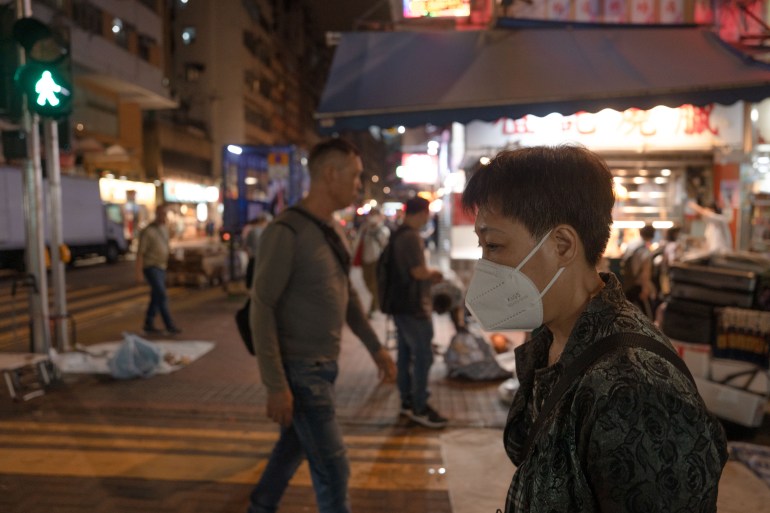Hong Kong, China – In her apartment in Sham Shui Po, 60-year-old Mrs Chan heats up leftover chicken for her teenage daughter. Their rented apartment is only 23 square metres (248 square feet), and the kitchen is cramped, filled with bags of rice and canned food from the local food bank.
Still, the family of four have no choice but to make do.
Her daughter had asked her if they could eat steamed fish for dinner. But by the time Chan finished her shift, the markets were already closed. In any case, she could not afford the ingredients that day.
“My ideal life would be to have a higher salary, so we could have a better life. Then, I would make more soup for my daughter,” she told Al Jazeera.
“When I do make soup, I dare not drink it. I want to keep it all for her.”
After a four-year freeze, Hong Kong’s minimum wage on Monday increased by 2.50 Hong Kong dollars ($0.32) to 40 Hong Kong dollars ($5.10) per hour, a rise of 6.25 percent.
The change means Chan’s earnings will go up — but she said it will not make much difference for her family.

“There is only an increase of 20 Hong Kong dollars [$2.55] per day and around 520 Hong Kong dollars [$66.24] per month. It’s not even enough to cover my daughter’s tutorial fees, which are 280 Hong Kong dollars [$35.67] per 1.5 hours,” Chan, who asked to be identified by a pseudonym, said.
“The small increase cannot beat inflation. Food is very expensive in Hong Kong. We normally have a simple dinner. But still, everything is an expense.”
Chan lives in one of the poorest areas of Hong Kong, a city with one of the most severe wealth gaps on earth. According to April data from the Census and Statistics Department, Sham Shui Po has a median household income of 22,280 Hong Kong dollars ($2,838), compared to 28,300 Hong Kong dollars ($3,605) for the Chinese territory as a whole.
The Chan family survives on an income of less than half of that amount. Her husband – 65 years old and in poor health – works odd jobs. Their monthly combined income is just more than 10,000 Hong Kong dollars ($1,274).
Sze Lai-shan from the Society for Community Organisation (SoCO), a welfare advocacy group, said the minimum wage increase is not enough.
“Most of the people we work with have similar problems,” Sze told Al Jazeera.
“They have to spend a lot on rent, on their children’s education expenses, and increasing cost of daily needs. They try to buy food late in the evening, so they can get cheaper prices because the food isn’t fresh anymore. Or they queue for free meals.”
“The increase in the minimum wage is not enough to beat inflation. It is not just about this year’s inflation but also the inflation of past years while there has not been an increase in people’s salaries.”

Sze also said the government should introduce a mechanism when setting the minimum wage, based on a set percentage of the median household income.
“Hong Kong is not comparable to developed cities like [in] Taiwan, Korea, and even Shenzhen, which set the minimum wage from 45 percent up to 70 percent of the median household income. Hong Kong is only about 38 percent.”
She suggested that the minimum wage should be at least 53.40 Hong Kong dollars ($6.80) and said the government should review it annually.
But while social workers push for an increase to the minimum wage, some high-profile legislators say the whole concept should be scrapped.

Tommy Cheung Yu-yan is one of the most vocal legislators against having a minimum wage at all.
“Minimum wage doesn’t help those sectors in need. It pushes everything up. Employees should get an increase when they increase their production, not when they sit there doing nothing,” Cheung told Al Jazeera.
“I see more harm than benefit, and so I speak out against it. The minimum wage is just politics. Wage should always be the reward of your productivity, not because somebody said you should get paid this much. That’s how we can get the economy in check and balance.”
Cheung also suggested that the minimum wage should not be on par with or higher than inflation.
“I believe the market is the most basic tool and the only tool that should be used to equate productivity,” he said.
The first-stage consultation on enhancing the minimum wage review mechanism launched by the Minimum Wage Commission ended last week and their report will be published in October.
The Commission was invited by Hong Kong’s Chief Executive John Lee in the 2022 Policy Address to study how to improve processes relating to the minimum wage, including how often it should be reviewed.

For Chan and families like hers, there is hope that the outcome of the review may be helpful in the future.
“My income is barely enough to support my family now. I cannot save money at all,” she said.
“Living in Hong Kong is so stressful. Even making soup is expensive.”
"low" - Google News
May 01, 2023 at 10:18AM
https://ift.tt/j2MuNwg
‘Not enough’: Hong Kong’s low-paid get $0.32 minimum wage bump - Al Jazeera English
"low" - Google News
https://ift.tt/y2ExStl
Bagikan Berita Ini














0 Response to "‘Not enough’: Hong Kong’s low-paid get $0.32 minimum wage bump - Al Jazeera English"
Post a Comment